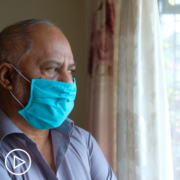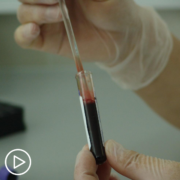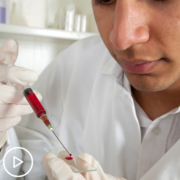Ask Your Doctor About These Essential Genetic Tests for CLL
Ask Your Doctor About These Essential Genetic Tests for CLL from Patient Empowerment Network on Vimeo.
Genetic testing results can impact a chronic lymphocytic leukemia (CLL) patient’s treatment options and provide a deeper understanding into their disease. Dr. Steven Coutre, a CLL specialist, reviews essential tests and explains their role in CLL care.
Dr. Steven Coutre is a Professor of Medicine in the Hematology Department at Stanford University Medical Center. Learn more about this expert here.
Related Resources

|

|

|
Transcript:
Dr. Steven Coutre:
In terms of testing for CLL, additional testing, of course, diagnostically, it’s generally not a challenge. It’s very straight-forward. A test that we call Flow Cytometry on a blood sample is usually sufficient to establish the diagnosis. Very, very uncommonly would a bone marrow exam be needed, for example. And in routine practice, also, we don’t necessarily give CT scans to establish a diagnosis or even to, as people say, stage the disease. It really isn’t necessary in most cases.
However, we do have a staging system that correlates with the extent of the disease and that’s simply based on our exam and blood counts, but people also want more information. They wanna know how they’re gonna do, specifically. So, we can add additional tests, genetic testing as people often call it, that can further subdivide individuals into groups that give you additional information on how you might do, meaning if you’re without symptoms, and an observation is recommended, you wanna know, “Well, how long is it gonna be before I need treatment?” Although our staging system gives that information, we can refine that further.
One test is the so-called FISH test, which looks at specific chromosome abnormalities, and the second test that’s generally used is called the IGHV Mutation Assay. That’s really looking at what’s called the mutational status of your immunoglobulin genes. So, it’s really those two broad categories that are most relevant.
Now, we don’t necessarily advocate doing that testing on everyone at the time of diagnosis. Certainly, not everyone who is without symptoms, where we’ve already decided that treatment is not indicated. So, as you can imagine, you can do that testing. You might come up with a profile that’s less favorable. And then, instead of the watch and wait approach, or as folks like to call it, “watch and worry approach,” you worry even more. But then, of course, if you have a favorable profile, then you’re happier. You’re more pleased.
However, we don’t do anything differently regardless of what those tests show, at least at current state. Compared to a decision that’s already been made about treat or not treat. We do, however, strongly advocate getting that testing at the time of treatment, and sometimes, repeating some of the testing with subsequent treatment, when you require treatment, say, a second time, in some cases. So, very important to have a discussion about these tests and what information you will get from them.
Well, we’ll often see patients who are coming for another opinion about their disease. Perhaps they’ve been recently diagnosed, and they have been advised for observation, so, it’s, of course, natural to ask whether that’s a reasonable approach. And in that context, other testing often comes up in the conversation. Perhaps they had the testing done, the FISH, and the mutational testing, and they wanna know what it means, or actually we see some results that have been obtained and we ask them about it. And there’s very often confusion, or really lack of information about what they mean.
So, we really try to discuss that issue. That issue of testing with each and every patient, whether or not they’ve had it done, really trying to let them know what it means. That way they’re fully informed, and in some cases, people feel very strongly that they would like to have it done, even through they realize that we’re not gonna act on it at that point. So, I think pretty much for all patients, it should be part of the initial discussion.
Again, in terms of genetic testing are these tests that I discussed. It’s important to understand what information they give you so you understand why your physician may be making a distinction between one therapy versus another. It is very, very important to get that testing, if somebody is talking about using chemotherapy, for example, hopefully. That’s quite uncommon. But with our newer agents, we know that they work broadly despite those other features.
Nevertheless, I think it’s important for a patient to at least expect the discussion about these tests. We’re not asking you to go to your physician and ask that they be done in all cases, but really understand perhaps why your physician recommended that they not be done at that particular time.



















